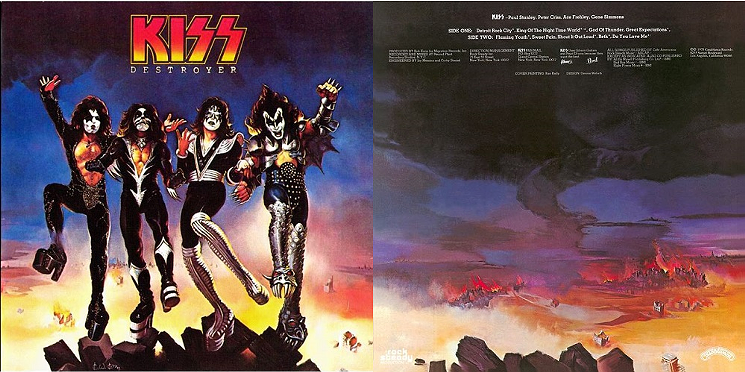Bob Ruggiero | Houston Press
 It was late 1975, and the career trajectory of KISS lay at a crucial crossroads. Despite the band’s wildly outlandish makeup and costumes, an increasingly bombastic stage show, and a small-but-dedicated fan base, their three studio albums to date had failed to garner much attraction and attention.
It was late 1975, and the career trajectory of KISS lay at a crucial crossroads. Despite the band’s wildly outlandish makeup and costumes, an increasingly bombastic stage show, and a small-but-dedicated fan base, their three studio albums to date had failed to garner much attraction and attention.
Then, the release of the single “Rock and Roll All Nite” fromAlive! — though how little “live” the double LP truly was has always been an open secret — got them some much-needed attention. But it was clear that the next studio album would be a make-or-break move for the group.
In the end, 1976’s Destroyer would catapult the band into the music and pop-culture stratosphere, alienate older fans while grabbing millions of new (and younger) ones, provide them a Top 10 hit and — largely through Ken Kelly’s astounding cover painting — cement the members as rock and roll comic-book superheroes. Interestingly, Kelly got the call for duty when the band’s original choice, well-known fantasy and comic-book artist Frank Frazetta, balked at giving up all rights to his work. And in a weird twist, Frazetta was Kelly’s uncle!
Campion is obviously a superfan, and his writing does come off sometimes as gushy. The glut of recording-studio technical information might make some readers’ eyes glaze over, and he has a habit of referring and re-referring to his previously sourced material too much. But these are minor concerns when overall, Campion’s recounting of the Destroyer days (as well as to a lesser extent, KISStory both before and after) is rich and multi-voiced.
It’s something he does with a combination of quotes and observations from many other KISS books and magazines, including the autobiographies of all four members; and original interviews with they-where-there people like assistant engineer Corky Stasiak, guitarist Dick Wagner (who would play many of Ace Frehley’s guitar parts when the wayward guitarist went MIA), record-company and band insiders, and — most importantly — producer Bob Ezrin.
Ah, Bob Ezrin. Hired on the basis of his monstrously successful albums with the Alice Cooper group (an obvious influence on KISS, who Ezrin called early on “four Alice Coopers”), he would function practically as a fifth band member for his shaping of the album and its sound.
And while he was bashed by older fans – and even band members – for his moving the band a bit away from its hard rock sound by utilizing strings, classical music, a children’s choir, and even including — gasp! – a ballad — it’s clear that Destroyer could not have been made as it ended up without his stamp.
That ballad, “Beth” had its origins in drummer Peter Criss’ previous group, Chelsea. Originally written as “Beck,” it was a tongue-in-cheek nod to a member’s wife named Becky, who would often call and berate her can’t-come-home-right-now husband. Fearing that it might be viewed as a love song to guitarist Jeff Beck, Criss, Ezrin and Stan Penridge massaged the lyrics about a lonely rock and roll widow and made the crucial name change.
Originally (and loudly) derided by Paul Stanley and Gene Simmons, the mushy B-side to “Detroit Rock City” became a hugely surprising crossover hit, resuscitating the fortunes of the album sales (which had been rapidly dropping) and marking the band’s only appearance with the original lineup in the Top 10 singles chart. That is, until another ballad, “Forever,” hit in 1990.
And Simmons has gladly counted each and every penny in royalties since then, despite the fact that Criss is the only member whose input actually appears on the song.
Still, the rest of the album’s subject matter is firmly in the group’s familiar territory of groupies (“Do You Love Me?”, “Great Expectations”), blue-collar night life (“Detroit Rock City,” “King of the Night Time World”), teenage angst (“Flaming Youth,” “Shout It Out Loud”), comic book fantasy (“God of Thunder”) and, well, plain old fucking (“Sweet Pain”).
Campion takes care to separate KISS as “The Act” (his term) in image and career path to fame and fortune from the musical development of Destroyer, though they were always kissin’ cousins.
“Destroyer is the indisputable KISS mission statement — the realization of a dream,” he writes in the book’s foreword. “[It] is ‘70s rock: loud, yes, and decadent, you bet, but mostly it is pompous, weird, and fantastical…It is a cartoon fantasy’s parody of excess.”
And with Shout It Out Loud, current and former soldiers in the KISS Army can find out all they care to on the making of their masterpiece.
